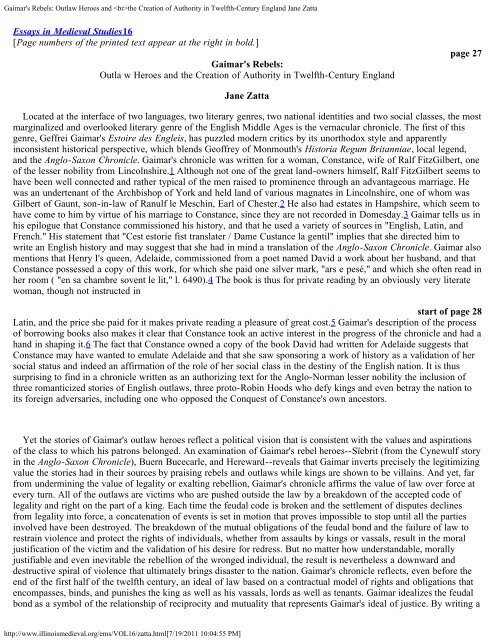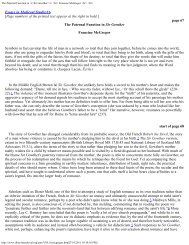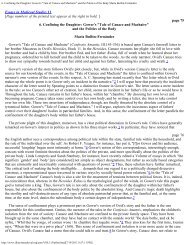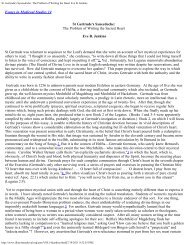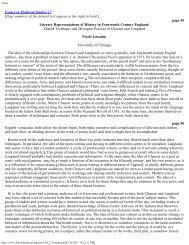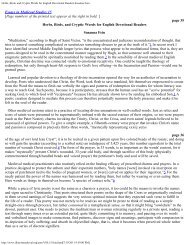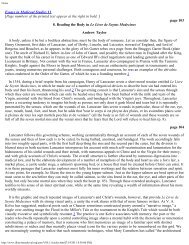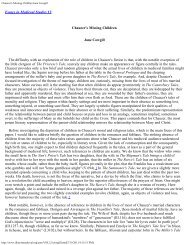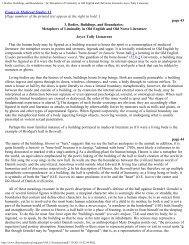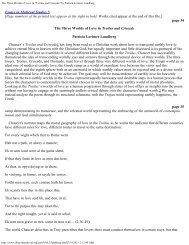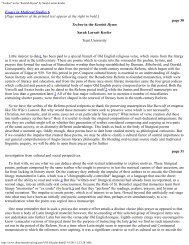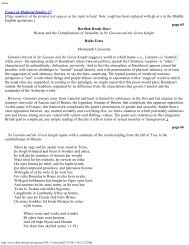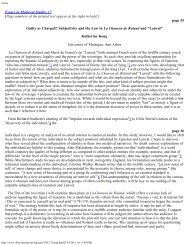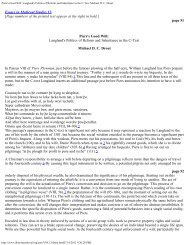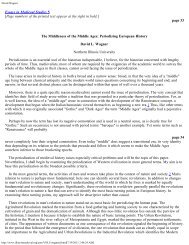Gaimar's Rebels: Outlaw Heroes and - Illinois Medieval ...
Gaimar's Rebels: Outlaw Heroes and - Illinois Medieval ...
Gaimar's Rebels: Outlaw Heroes and - Illinois Medieval ...
You also want an ePaper? Increase the reach of your titles
YUMPU automatically turns print PDFs into web optimized ePapers that Google loves.
<strong>Gaimar's</strong> <strong>Rebels</strong>: <strong>Outlaw</strong> <strong>Heroes</strong> <strong>and</strong> the Creation of Authority in Twelfth-Century Engl<strong>and</strong> Jane Zatta<br />
Essays in <strong>Medieval</strong> Studies16<br />
[Page numbers of the printed text appear at the right in bold.]<br />
<strong>Gaimar's</strong> <strong>Rebels</strong>:<br />
Outla w <strong>Heroes</strong> <strong>and</strong> the Creation of Authority in Twelfth-Century Engl<strong>and</strong><br />
page 27<br />
Jane Zatta<br />
Located at the interface of two languages, two literary genres, two national identities <strong>and</strong> two social classes, the most<br />
marginalized <strong>and</strong> overlooked literary genre of the English Middle Ages is the vernacular chronicle. The first of this<br />
genre, Geffrei <strong>Gaimar's</strong> Estoire des Engleis, has puzzled modern critics by its unorthodox style <strong>and</strong> apparently<br />
inconsistent historical perspective, which blends Geoffrey of Monmouth's Historia Regum Britanniae, local legend,<br />
<strong>and</strong> the Anglo-Saxon Chronicle. <strong>Gaimar's</strong> chronicle was written for a woman, Constance, wife of Ralf FitzGilbert, one<br />
of the lesser nobility from Lincolnshire.1 Although not one of the great l<strong>and</strong>-owners himself, Ralf FitzGilbert seems to<br />
have been well connected <strong>and</strong> rather typical of the men raised to prominence through an advantageous marriage. He<br />
was an undertenant of the Archbishop of York <strong>and</strong> held l<strong>and</strong> of various magnates in Lincolnshire, one of whom was<br />
Gilbert of Gaunt, son-in-law of Ranulf le Meschin, Earl of Chester.2 He also had estates in Hampshire, which seem to<br />
have come to him by virtue of his marriage to Constance, since they are not recorded in Domesday.3 Gaimar tells us in<br />
his epilogue that Constance commissioned his history, <strong>and</strong> that he used a variety of sources in "English, Latin, <strong>and</strong><br />
French." His statement that "Cest estorie fist translater / Dame Custance la gentil" implies that she directed him to<br />
write an English history <strong>and</strong> may suggest that she had in mind a translation of the Anglo-Saxon Chronicle. Gaimar also<br />
mentions that Henry I's queen, Adelaide, commissioned from a poet named David a work about her husb<strong>and</strong>, <strong>and</strong> that<br />
Constance possessed a copy of this work, for which she paid one silver mark, "ars e pesé," <strong>and</strong> which she often read in<br />
her room ( "en sa chambre sovent le lit," l. 6490).4 The book is thus for private reading by an obviously very literate<br />
woman, though not instructed in<br />
start of page 28<br />
Latin, <strong>and</strong> the price she paid for it makes private reading a pleasure of great cost.5 <strong>Gaimar's</strong> description of the process<br />
of borrowing books also makes it clear that Constance took an active interest in the progress of the chronicle <strong>and</strong> had a<br />
h<strong>and</strong> in shaping it.6 The fact that Constance owned a copy of the book David had written for Adelaide suggests that<br />
Constance may have wanted to emulate Adelaide <strong>and</strong> that she saw sponsoring a work of history as a validation of her<br />
social status <strong>and</strong> indeed an affirmation of the role of her social class in the destiny of the English nation. It is thus<br />
surprising to find in a chronicle written as an authorizing text for the Anglo-Norman lesser nobility the inclusion of<br />
three romanticized stories of English outlaws, three proto-Robin Hoods who defy kings <strong>and</strong> even betray the nation to<br />
its foreign adversaries, including one who opposed the Conquest of Constance's own ancestors.<br />
Yet the stories of <strong>Gaimar's</strong> outlaw heroes reflect a political vision that is consistent with the values <strong>and</strong> aspirations<br />
of the class to which his patrons belonged. An examination of <strong>Gaimar's</strong> rebel heroes--Sïebrit (from the Cynewulf story<br />
in the Anglo-Saxon Chronicle), Buern Bucecarle, <strong>and</strong> Hereward--reveals that Gaimar inverts precisely the legitimizing<br />
value the stories had in their sources by praising rebels <strong>and</strong> outlaws while kings are shown to be villains. And yet, far<br />
from undermining the value of legality or exalting rebellion, <strong>Gaimar's</strong> chronicle affirms the value of law over force at<br />
every turn. All of the outlaws are victims who are pushed outside the law by a breakdown of the accepted code of<br />
legality <strong>and</strong> right on the part of a king. Each time the feudal code is broken <strong>and</strong> the settlement of disputes declines<br />
from legality into force, a concatenation of events is set in motion that proves impossible to stop until all the parties<br />
involved have been destroyed. The breakdown of the mutual obligations of the feudal bond <strong>and</strong> the failure of law to<br />
restrain violence <strong>and</strong> protect the rights of individuals, whether from assaults by kings or vassals, result in the moral<br />
justification of the victim <strong>and</strong> the validation of his desire for redress. But no matter how underst<strong>and</strong>able, morally<br />
justifiable <strong>and</strong> even inevitable the rebellion of the wronged individual, the result is nevertheless a downward <strong>and</strong><br />
destructive spiral of violence that ultimately brings disaster to the nation. <strong>Gaimar's</strong> chronicle reflects, even before the<br />
end of the first half of the twelfth century, an ideal of law based on a contractual model of rights <strong>and</strong> obligations that<br />
encompasses, binds, <strong>and</strong> punishes the king as well as his vassals, lords as well as tenants. Gaimar idealizes the feudal<br />
bond as a symbol of the relationship of reciprocity <strong>and</strong> mutuality that represents <strong>Gaimar's</strong> ideal of justice. By writing a<br />
http://www.illinoismedieval.org/ems/VOL16/zatta.html[7/19/2011 10:04:55 PM]
<strong>Gaimar's</strong> <strong>Rebels</strong>: <strong>Outlaw</strong> <strong>Heroes</strong> <strong>and</strong> the Creation of Authority in Twelfth-Century Engl<strong>and</strong> Jane Zatta<br />
history that values the contribution of individuals to the success or failure of the nation not according to their rank or<br />
lineage but according to the extent to which they uphold a code of right <strong>and</strong> law, Gaimar appropriates to the noble<br />
classes the authority that the royal histories were claiming for the monarchy.<br />
The Norman fiction that they were the heirs <strong>and</strong> continuators of Edward<br />
start of page 29<br />
the Confessor provided the impetus for a great deal of interest by Normans in the English past.7 Both William <strong>and</strong><br />
Henry, as well as their successors, claimed in their charters to uphold the laws of Edward, <strong>and</strong> after the Conquest,<br />
l<strong>and</strong>s were distributed to William's Norman followers by the fiction of assigning each Norman magnate an English<br />
"antecessore" whose l<strong>and</strong>s the Norman "inherited." In addition to ancestral grants, l<strong>and</strong> was distributed to Normans by<br />
fiefs that were new creations as well as in many cases by the plundering of opportunistic Normans who took<br />
possession of as many manors as they could by sheer naked force. Through the compilation of the Domesday Book in<br />
1086, William obtained a record of the value of every estate in Engl<strong>and</strong> as well as the terms under which it was held.<br />
Domesday served both to confirm <strong>and</strong> legalize the Norman rape of English l<strong>and</strong>s, as well as to reveal the trespasses of<br />
those who had taken property illegally, since every Norman had to explain how he had acquired his l<strong>and</strong>s. Domesday<br />
thus served to stimulate a flurry of interest in the English past, as Normans sought to produce charters, many of them<br />
forged, to justify claims to holdings, as well as claims to exemptions from taxes, dem<strong>and</strong>s for military service, <strong>and</strong><br />
other obligations. Recourse to litigation, law, <strong>and</strong> courts bolstered by supposedly ancient English records replaced<br />
force as a means by which Norman tenants sought to protect their property from Norman usurpation. By the twelfth<br />
century, Norman tenants had pioneered a strategy of using the English past to support their claims to exemptions from<br />
taxes <strong>and</strong> services to Norman barons <strong>and</strong> monarchs.8<br />
The detailed record of l<strong>and</strong>s, estates, <strong>and</strong> holdings accumulated through the Domesday Book <strong>and</strong> made possible by<br />
the existing framework of English governmental divisions of hundred <strong>and</strong> shire gave the Norman kings unprecedented<br />
control over l<strong>and</strong> <strong>and</strong> inheritance. At the same time, the English monarchs' attempts to centralize their power through<br />
the legal system meant that in Engl<strong>and</strong> a concept of legality developed that offered vassals increasingly greater<br />
recourse against the arbitrary will of a lord. By giving the king authority over the transmission of virtually all<br />
significant property rights, Henry I's Charter established the precedence of the King's law above the myriad local laws<br />
<strong>and</strong> customs that prevailed in different parts of the country.9 Thus the law promised to offset, to a degree, what was<br />
lost to an unusually centralized monarchy. Vassals who felt themselves unjustly treated by their lords as well as lords<br />
whose vassals failed to respect the terms of their grants could appeal directly to the king, who was frequently involved<br />
in the resolution of disputes regarding l<strong>and</strong>.10 Recently, in contrast to the older view denying the existence of rights<br />
before there was a common law to uphold them, work by scholars such as P. R. Hyams, John Hudson <strong>and</strong> others has<br />
shown that by the twelfth century, although lordship was in theory an absolute submission of vassal to lord, in<br />
customary practice it was felt that lords could not impose their will by force for more than had been agreed upon.11<br />
Likewise, there was a general feeling that the lord should respect the judgment of the peers of his court--all<br />
start of page 30<br />
his tenants--<strong>and</strong> even if this was not an obligation, it was beneficial for a lord to do so. It seems clear that the notion of<br />
the reciprocally binding nature of the lordship relationship was growing throughout the twelfth century, so that by the<br />
end of the century, Glanville could state that "the nexus between a lord <strong>and</strong> his tenant through homage is thus of so<br />
great <strong>and</strong> of such quality that the lord owes as much to the tenant as the tenant to the lord, reverence alone<br />
excepted."12<br />
<strong>Gaimar's</strong> chronicle is remarkable for the way he anticipates <strong>and</strong> helps to shape the peculiarly English sense of<br />
legality that reconciles respect for hereditary right <strong>and</strong> precedent with a contractual model of the feudal bond based on<br />
mutual obligations <strong>and</strong> benefit. <strong>Gaimar's</strong> outlaw stories reveal, as early as 1137, a concept of law as a reciprocally<br />
binding constraint on the behavior of lords as well as vassals. All of <strong>Gaimar's</strong> stories of outlaws dramatize a radical<br />
http://www.illinoismedieval.org/ems/VOL16/zatta.html[7/19/2011 10:04:55 PM]
<strong>Gaimar's</strong> <strong>Rebels</strong>: <strong>Outlaw</strong> <strong>Heroes</strong> <strong>and</strong> the Creation of Authority in Twelfth-Century Engl<strong>and</strong> Jane Zatta<br />
violation of the obligations of lordship on the part of a king: a treasonous disinheritance, a gross violation of the rights<br />
of a vassal, as when the king rapes the wife of his most loyal vassal, or the swearing of a false feudal oath by a king.<br />
All employ an array of rhetorical techniques meant to heighten sympathy with the victims <strong>and</strong> blacken the villainy of<br />
the king. The outlaws are daring, courageous, noble, loyal <strong>and</strong> bold, while the kings are treacherous, cowardly,<br />
deceitful <strong>and</strong> lustful. Gaimar employs extensive editorializing to denounce the wrongdoing of the royal villains <strong>and</strong> an<br />
array of legalistic terminology which imposes on lords the same obligations <strong>and</strong> constraints originally considered<br />
binding only on tenants.<br />
In the first of these outlaw episodes, Gaimar radically alters the famous Anglo-Saxon Chronicle account of<br />
Cynewulf <strong>and</strong> Cyneheard, transforming it from a drama of the conflicting loyalties of kinship <strong>and</strong> lordship into the<br />
story of an interrupted inheritance. The changes Gaimar makes are as radical as they are purposeful. In <strong>Gaimar's</strong><br />
version, Kenewlf wrongs his nephew Sïebrit, the rightful heir, by seizing the kingdom <strong>and</strong> then exiling him. After the<br />
death of King Guthred of Wessex, his cousin Siebr<strong>and</strong> succeeded him but ruled for only a year, followed by his son,<br />
Sïebrit. After that, according to Gaimar, Kenewlf usurped the throne from his nephew Sïebrit, a crime that Gaimar<br />
frames in terms of the twelfth-century preoccupation with l<strong>and</strong> tenure. He describes Kenewlf's offense as a<br />
disinheritance ("Kenewlf desheritad Siebrït"), a deed which Gaimar defines as an act of treason: "Par traisun que orent<br />
menee" ("By the treason which they demonstrated" l. 1814).13 Gaimar repeatedly condemns Kenewlf's actions in the<br />
strongest possible terms, as an offense against religion, reason, <strong>and</strong> law.<br />
Cel Sïebrit k'il ot cacied<br />
Ert sun cusin mais par pechied<br />
E par cunseil de ses baruns,<br />
Qui furent fols e mult feluns<br />
[Estait li reis vers li marriz]. (1829-33)<br />
start of page 31<br />
(This Sïebrit that he had chased away was his cousin, but because of sin <strong>and</strong> the wicked advice of his barons, who<br />
were foolish <strong>and</strong> extremely felonious, the king became angry with him.)<br />
<strong>Gaimar's</strong> choice of terminology is significant; the term "felony" has feudal connotations. According to Glanville, it<br />
indicated not just a crime but "a breach of the faith owed by a man to his lord so fundamental as to end the<br />
relationship <strong>and</strong> so entitle the lord to retake the tenement <strong>and</strong> treat it as his own free disposal."14 Likewise, "traison"<br />
participated in the same feudal connotations as "felony" in addition to its specific meaning as an offense against a<br />
monarch. Gaimar here extends the meaning of "felony" from a crime of a tenant against a lord to include the violation<br />
of the rights of a vassal by a king.<br />
Gaimar also replaces Sïebrit's death in the Andredswald with Cumbra's, thus leaving Sïebrit conveniently alive. In<br />
the Anglo-Saxon Chronicle, Sïebrit's bad reputation was compounded by the fact that after having been exiled from his<br />
kingdom, he committed the heinous crime of killing the ealdorman Cumbra, who had been faithful to him the longest,<br />
thus bringing about his own death at the h<strong>and</strong>s of a swineherd in revenge for the murder of Cumbra. In <strong>Gaimar's</strong><br />
account, after the exile of Sïebrit, Cumbra (who is not named until later) conducts a long guerrilla war against Kenewlf<br />
from the Andredswald where he is killed by a swineherd who is presumably one of Kenewlf's men. The wrongful<br />
disinheritance of Sïebrit <strong>and</strong> the murder of Cumbra produce another act of violence, which, though foolish <strong>and</strong> futile,<br />
is not only underst<strong>and</strong>able but inevitable. Sïebrit's brother, Kenehard, locates Kenewlf with a woman, <strong>and</strong>, out of a<br />
misguided desire to avenge his brother, attacks <strong>and</strong> kills him. Kenewlf's men immediately kill Kenehard, whereupon<br />
Sïebrit hears the commotion <strong>and</strong> arrives just in time to dispatch the remaining men. Sïebrit delivers an heroic speech<br />
justifying the legitimacy of his revenge. He has avenged himself according to his right: "'[S]eignurs,' fait il, 'ne<br />
http://www.illinoismedieval.org/ems/VOL16/zatta.html[7/19/2011 10:04:55 PM]
<strong>Gaimar's</strong> <strong>Rebels</strong>: <strong>Outlaw</strong> <strong>Heroes</strong> <strong>and</strong> the Creation of Authority in Twelfth-Century Engl<strong>and</strong> Jane Zatta<br />
m'asaillez / Kar je m'en sui par dreit vengiez'" (ll.1867-8) ("'Lords,' said he, do not attack me because I have avenged<br />
myself by right'"). Sïebrit explains that he is the one who should have held the l<strong>and</strong> by the judgment of the barons <strong>and</strong><br />
ruled the kingdom since he was the lawful heir.<br />
[Vus] savez bien, si cum jo crei,<br />
Que sui fiz Sï[e]brant le rei,<br />
Si deüsse par jugement<br />
Tenir le regne, aveir la gent. (ll. 1869-72)<br />
(You know well, as I believe, that I am the son of Sigebr<strong>and</strong> the king. I should have held the kingdom by judgment<br />
<strong>and</strong> ruled the people.)<br />
Nevertheless he offers them a pact of peace formulated in terms of the necessary accord between barons <strong>and</strong> king. If<br />
the barons will restore him to his former rights, he in turn will grant them all their hereditary holdings together with an<br />
increase. The terms proposed by Sïebrit express the mutual<br />
start of page 31<br />
service <strong>and</strong> reciprocal dependence enshrined in ceremony <strong>and</strong> custom that characterize the legally ordered society.<br />
Si me faites rendre m'onur<br />
Par tel covent cum jo l'avrai<br />
Chascun de vus s'onur rendrai<br />
E creissement vus durai gr<strong>and</strong>. (ll. 1878-80)<br />
(If you will return my honor to me, by such an agreement as soon as I would have it, I would return each of your<br />
honors to you <strong>and</strong> a great increase I would give you as well.)<br />
The alternative to a legal solution is a violent confrontation in which all the contestants are destroyed. Gaimar is at<br />
pains to point out that every participant in the conflict--the uncle who tried to disinherit his nephew, the barons who<br />
colluded with him, the baron who fought against Kenewlf for a long time <strong>and</strong> was killed by the swineherd, Kenehard<br />
who tried to avenge his brother's wrong, <strong>and</strong> Sïebrit himself--were all utterly destroyed, <strong>and</strong> the kingdom for which<br />
they fought eluded all of them.<br />
Eissi finad iceste guere.<br />
Or [n'out] nul d'els [gueres] la terre,<br />
L'uncle ne lez nevoz ne l'unt<br />
Ne les baruns qui morz en sunt<br />
Ne Cumbran qui se cumbatid<br />
Qui en Andredeswald fuïd<br />
Que li porchiers el bois ocist.<br />
Mult mal eire home qui traïst. (ll. 1889-908)<br />
(This is how this war ended. Now none of them got the l<strong>and</strong>. Neither the uncle nor the nephews had it, nor the barons<br />
who died, nor Cumbra who fought <strong>and</strong> who fled to the Andredeswald <strong>and</strong> who was killed by the swineherd in the<br />
forest. Very badly behaved the man who started that feud.)<br />
http://www.illinoismedieval.org/ems/VOL16/zatta.html[7/19/2011 10:04:55 PM]
<strong>Gaimar's</strong> <strong>Rebels</strong>: <strong>Outlaw</strong> <strong>Heroes</strong> <strong>and</strong> the Creation of Authority in Twelfth-Century Engl<strong>and</strong> Jane Zatta<br />
Like his Haveloc episode, <strong>Gaimar's</strong> version of Buern Bucecarle, the first known version for this story, found favor<br />
with later writers, finally making its way into the Brut or the Chronicles of Engl<strong>and</strong>.15 The source for <strong>Gaimar's</strong> story<br />
is an obscure entry in the Anglo-Saxon Chronicle for the year 867 which records that the people of Northumbria<br />
repudiated their king Osberht <strong>and</strong> chose instead a man of non-noble birth, Aella. Gaimar exploits the opening offered<br />
by this bare <strong>and</strong> cryptic entry to construct a remarkable <strong>and</strong> complex tale of more than 200 lines that is best understood<br />
in terms of its legal implications. In this episode, Gaimar furnishes an explanation for the repudiation of Osbrith<br />
consistent with his theme of the disastrous consequences that ensue when a king violates the obligations of the feudal<br />
oath. According to <strong>Gaimar's</strong> account, the arrival of the Danes in the late ninth century is precipitated by the rebellion of<br />
Buern Bucecarle, who summons Danish aid in order to exact vengeance after King Osbrith rapes his wife. This story<br />
dramatizes the negastart<br />
of page 33<br />
tive consequences, not just to a single subject but to an entire nation, of a king who fails to respect the rights of his<br />
vassals.<br />
By stressing the parallels between married love <strong>and</strong> feudal relations, both of which entail the exchange of loyal<br />
service for protection <strong>and</strong> defense, <strong>Gaimar's</strong> story justifies the rebellion of a vassal even to the point of aiding a foreign<br />
invasion. Buern, described as "the best vassal in the l<strong>and</strong>," was ironically busy guarding the coast against "uhtlages"<br />
(outlaws) when the king went to his house <strong>and</strong> raped his wife. The king lacks both loyalty <strong>and</strong> compassion. The rape<br />
was premeditated: the king had been informed of Buern's absence. After raping Buern's wife, he returns to London<br />
"where he jokes about it many times with his intimates." In addition to being an ideal vassal, Buern's reaction to his<br />
wife's violation--his tender solicitude for her well-being, his unhesitating loyalty, <strong>and</strong> his insistence on justice--is a<br />
model of the sort of benevolent authority based on the obligation of defense in exchange for true service that should<br />
have governed the relationship between king <strong>and</strong> vassal, a relationship that Osbrith's actions perverted in every<br />
point.16<br />
What is remarkable about <strong>Gaimar's</strong> treatment of the rape of Buern's wife is the array of legal arguments brought to<br />
bear on the offense. The repeated references (ll. 2599, 2601, 2634, 2663, 2686) to the king's crime in terms of hunte<br />
(shame) may suggest the legal stigma of infamia, a condition that the canonists attached to sexual crimes such as<br />
adultery, incest, bestiality, homosexuality <strong>and</strong> rape <strong>and</strong> which made a man unfit to hold offices of public trust <strong>and</strong><br />
entailed the loss of legal status, such as the right to appear in court as either complainant or witness.17 Thus Gaimar<br />
characterizes the king as someone who has lost his legal status <strong>and</strong> as a result his right to hold the monarchy.<br />
Buern's wife also presents her humiliation as an offense against right <strong>and</strong> offers herself as a sacrifice to satisfy the<br />
requirements of justice: "Puis faites de me tel justise / Cum fusse a larecin prise" (ll. 2651-2) ("Then give me such<br />
justice as if I had been taken in theft"). By dem<strong>and</strong>ing to be punished as if she had been taken in a theft, she describes<br />
her rape as one of the crimes that directly threaten the feudal relationship. The Leges Henrici included theft as one of<br />
the crimes that would justify the end of the lordship relationship.18 In civil law, rape was widely regarded as a form of<br />
theft <strong>and</strong> an offense against the property rights of the woman's male relatives, <strong>and</strong> the prescribed penalty was<br />
sometimes death.19 This is the position of both Buern <strong>and</strong> his wife who regard the offense as sufficiently grave to<br />
warrant death, a sacrifice Buern's wife is ready to assume herself. She tells him, "Ore est dreit que [perde] la vie" (l.<br />
2656) ("Now it is right for me to lose my life"). In a touching scene, Buern reassures his wife of her innocence <strong>and</strong><br />
promises to seek justice from the author of this crime: "Si li fel fist sa felunie, / Jo querrai que il perdra la vie" (ll.<br />
2671-2) ("As the felon committed this felony, I will ask that he lose his life").<br />
http://www.illinoismedieval.org/ems/VOL16/zatta.html[7/19/2011 10:04:55 PM]
<strong>Gaimar's</strong> <strong>Rebels</strong>: <strong>Outlaw</strong> <strong>Heroes</strong> <strong>and</strong> the Creation of Authority in Twelfth-Century Engl<strong>and</strong> Jane Zatta<br />
By the twelfth century the most serious crimes, such as rape <strong>and</strong> abducstart<br />
of page 34<br />
tion, arson, robbery, theft, treason, breach of fealty, <strong>and</strong> murder were called felonies <strong>and</strong> came under the jurisdiction of<br />
the crown.20 When Buern accuses the king of a felony, he is reversing the traditional meaning of the word as a crime<br />
of a man against his lord <strong>and</strong> using it to indicate the crime of a king against his vassal, thus suggesting that the law<br />
protects equally the rights of a vassal as well as those of a king. The conclusion that the king is a felon leads Buern to<br />
make an heroic speech of defiance which makes clear that the king's right to his vassal's loyalty is conditional upon<br />
respect of his vassal's rights. Buern's renunciation of his homage <strong>and</strong> allegiance points out that the lordship relationship<br />
can be voided by the crimes of a king as well as by those of a vassal.<br />
Jo te desfi e tut te rent,<br />
De tei ne voil tenir neient,<br />
Tun humage ci te rendrai,<br />
Ja mais de tei rien ne tendrai. (ll. 2679-82)<br />
(I defy you <strong>and</strong> return everything to you. I do not wish to hold anything from you. I give you back my homage. I will<br />
never hold anything from you.)<br />
Accusing the king of a felony, a type of crime that fell ordinarily under royal jurisdiction, raises the question of the<br />
competence to adjudicate an appeal brought in this instance against the king. Buern presents his case to a council of<br />
his lineage <strong>and</strong> informs them that he intends to summon Danish aid to take revenge on the king. The fact that Buern<br />
makes his claim to a family council suggests that the kin of the aggrieved men are those who should give him law. The<br />
term forfait, which signified a transgression or violation of rights, emphasizes the legal nature of the decision taken by<br />
the council of Buern's relatives to repudiate the king.<br />
E ses parenz li unt pramis<br />
Qu'il le metrunt fors del païs<br />
Si firent il. Pur cel forfait<br />
Le rei guerpire entreshait. (ll. 2693-6)<br />
(And his relatives promised him that they would put him out of the country <strong>and</strong> so they did. For the transgression that<br />
he had committed they ab<strong>and</strong>oned the king immediately.)<br />
At this point Gaimar radically changes the tone of the story, launching into a highly romanticized tale that might<br />
seem unrelated to the rape of Buern's wife <strong>and</strong> Buern's subsequent outlawry. This episode relates that the newlychosen<br />
King Elle, out hunting one day, was approached by a mysterious, blind beggar who cryptically informs him that<br />
he has lost his kingdom to the Danes (summoned by Buern) who have already killed Osbrith <strong>and</strong> that both he <strong>and</strong> his<br />
beloved nephew Orin will die at the Battle of York that day. After threatening the man with death if he is lying, Elle<br />
orders his nephew to be imprisoned in a tower to prevent the prophecy from being fulfilled <strong>and</strong> rushes off<br />
start of page 35<br />
to York. At this point Orin, believing that he can fly with two shields as wings, jumps from the tower, crashing to the<br />
ground miraculously unhurt. Taking a horse <strong>and</strong> three spears from a man conveniently at h<strong>and</strong>, he races off to York. In<br />
a passage reminiscent of the episode of Taillefer at the Battle of Hastings, Orin arrives at York just in time to be the<br />
first person to strike a blow in the battle <strong>and</strong>, after killing two Danes, is himself struck <strong>and</strong> killed. Seeing his nephew<br />
http://www.illinoismedieval.org/ems/VOL16/zatta.html[7/19/2011 10:04:55 PM]
<strong>Gaimar's</strong> <strong>Rebels</strong>: <strong>Outlaw</strong> <strong>Heroes</strong> <strong>and</strong> the Creation of Authority in Twelfth-Century Engl<strong>and</strong> Jane Zatta<br />
die in front of his eyes, Elle throws himself wildly into the battle, <strong>and</strong> he too is killed by the Danes, thereby fulfilling<br />
the beggar's prophecy.<br />
The interjection of the supernatural into the episode of the defeat at York suggests a trial by battle, a legal form<br />
introduced into Engl<strong>and</strong> by the Normans <strong>and</strong> used in the twelfth century to test the appeal of felony, the very appeal<br />
that Buern made against Osbrith. The prominent role of prophecy in the Battle at York implies divine participation, a<br />
crucial element of a trial by battle. Having announced to Elle the events that will take place that day in York, the<br />
beggar points out that foreknowledge cannot prevent what has been preordained. In addition, the statement that a king<br />
must lose his head at York seems to imply that the defeat of the English by the Danes is not just a punishment of a<br />
particular monarch, but of the monarchy as an institution.<br />
"Si tu m'en creiz, ne iras avant<br />
E nepuroc ne pot el estre,<br />
Uns reis i deit perdre la teste" (ll. 2750-2)<br />
("If you believe me, you will not go, <strong>and</strong> yet, it cannot be otherwise; a king must lose his head there.")<br />
The story insists on the supernatural nature of the beggar's knowledge. When Elle asks the beggar how he knows the<br />
truth of his prophecies, the beggar replies, "Mun sen le m'ad si demustrez. / As enseignes, se m'en crëez" (ll. 2744-5)<br />
("My underst<strong>and</strong>ing has shown it to me by signs, if you believe me"). The king accuses him of sorcery, which the<br />
beggar denies, <strong>and</strong> the point-by-point correspondence of the prophecy with the events that follow indicates that the<br />
source of the beggar's knowledge was not sorcery but divine revelation. On the way to York the king encounters<br />
wounded people fleeing from the battle who confirm everything the beggar had said.<br />
Asez [encontret] des navrez<br />
E des fuianz qui unt [cuntez]<br />
Tut ço ke li devins ot dit.<br />
[Neis] un sul mot n'aveit mentid. (ll. 2769-70)<br />
(He encountered many of the wounded <strong>and</strong> the refugees who told him exactly what the seer had said. Not a single<br />
word of what he had said was a lie.)<br />
Orin's death also fulfills the prophecy, <strong>and</strong> the text stresses again that what has been ordained by God cannot be<br />
avoided: "L'aneme s'en vait, li cors chaïd / Si cum li orps aveit geïd" (ll. 2813-4) (The soul departs, the body falls just<br />
as the blind man had predicted). The preordained <strong>and</strong> fated nature of the Battle of York<br />
start of page 36<br />
underscores the significance of the defeat as a divine judgment on the crimes of the English monarchy. Rather than<br />
constituting "outlawry," Buern's acts of renouncing his homage, defying his king, <strong>and</strong> claiming the Danes as his<br />
champions are attempts at seeking justice <strong>and</strong> law. The illegal acts of the king, who should be the root <strong>and</strong> foundation<br />
of the law, bring anarchy, lawlessness <strong>and</strong> defeat to the nation, resulting finally in the destruction of the monarchy. Not<br />
only Osbrith, but Elle, <strong>and</strong> even Elle's nephew all perish.<br />
http://www.illinoismedieval.org/ems/VOL16/zatta.html[7/19/2011 10:04:55 PM]
<strong>Gaimar's</strong> <strong>Rebels</strong>: <strong>Outlaw</strong> <strong>Heroes</strong> <strong>and</strong> the Creation of Authority in Twelfth-Century Engl<strong>and</strong> Jane Zatta<br />
Finally, <strong>Gaimar's</strong> account of the Norman Conquest differs dramatically from those of his contemporaries <strong>and</strong><br />
predecessors. Gaimar omits the usual features of the Norman account: Harold's broken promise, the bad behavior of<br />
the English the night before the attack, the supposed desertion within the English ranks. Instead Gaimar confines his<br />
account of William's reign almost entirely to the story of the outlaw Hereward. <strong>Gaimar's</strong> version of this popular story<br />
is one of the earliest if not the first, possibly preceded by the Latin romance, the Gestis Herewardis, supposedly written<br />
at Ely by a monk named Robert between 1109-31. <strong>Gaimar's</strong> Hereward episode traces the northern risings against<br />
William to the perfidy of the king himself who betrayed the loyalty of his English barons. According to Gaimar, in the<br />
year following the Conquest, William journeyed to Nottingham to make peace with his northern subjects. Although<br />
William's journey to Nottingham is historical, Gaimar is the only source for what follows. Through the Archbishop of<br />
York, William issued a proclamation that all those who would accept him as their lord <strong>and</strong> swear homage to him would<br />
receive all their hereditary holdings to hold in peace <strong>and</strong> quiet. Gaimar stresses the fact that they were promised peace,<br />
safety, quiet <strong>and</strong> freedom from distress; William pledged that they would be allowed to:<br />
En pais aler e salf venir;<br />
Cil ki de lui voldrat partire,<br />
Alt s'en ariere seinement,<br />
Ja n'i avrat destrurbement. (ll. 5387-90)<br />
(Come <strong>and</strong> go in peace <strong>and</strong> safety <strong>and</strong> return safely <strong>and</strong> never have any disturbance.)<br />
But when the barons arrived at York, naively believing William's promises, William had them imprisoned <strong>and</strong><br />
distributed their l<strong>and</strong>s to his French followers. Although it is not clear whether William actually received homage from<br />
the barons, his false promise delivered by the Archbishop of York who had administered his coronation oath is a<br />
shocking betrayal of his word completely in conflict with the king's obligation to uphold the law.<br />
In contrast to William who appears as a lying, cowardly bully <strong>and</strong> traitor, the outlaw Hereward is a character of<br />
heroic stature: daring, resourceful, courageous <strong>and</strong> bold. Hereward is depicted in several episodes performing<br />
spectacular feats, including a daring escape from the siege at Ely with five companstart<br />
of page 37<br />
ions hidden under rushes in the boat of a fishmonger who delivers them into an unsuspecting encampment of Norman<br />
soldiers whom the outlaws quickly dispatch. For many years Hereward <strong>and</strong> his allies war against the Normans.<br />
Hereward is so hardy <strong>and</strong> courageous that he can take on seven Normans at a time. Finally Hereward makes a truce<br />
with William in exchange for agreeing to help William in his war against the Mansels. But the Normans, envious of<br />
the wealth that Hereward has accumulated, break the peace <strong>and</strong> attack him by surprise while he is eating. Gaimar<br />
dedicates almost one hundred lines to the battle between Hereward <strong>and</strong> his attackers during which Hereward defends<br />
himself first with a lance, then with a sword <strong>and</strong> finally with a shield, killing fifteen Normans before being killed<br />
himself. Like S‹ebrit <strong>and</strong> Buern, Hereward delivers an heroic speech of defiance to his attackers in which he accuses<br />
the king of treachery, betrayal, <strong>and</strong> treason:<br />
"Triwes m'aveit done li reis<br />
Mais vus venez ireement,<br />
Le mien pernez, tuez ma gent.<br />
Suspris m'avez a mun mangier,<br />
Fels traitres, vendrai mei chier." (ll. 5630-34)<br />
http://www.illinoismedieval.org/ems/VOL16/zatta.html[7/19/2011 10:04:55 PM]
<strong>Gaimar's</strong> <strong>Rebels</strong>: <strong>Outlaw</strong> <strong>Heroes</strong> <strong>and</strong> the Creation of Authority in Twelfth-Century Engl<strong>and</strong> Jane Zatta<br />
("The king gave me a truce but you come here in hostility <strong>and</strong> take my goods, kill my people. You have surprised me<br />
at my meal. Traitors <strong>and</strong> felons, I shall sell myself dearly.")<br />
: <strong>Gaimar's</strong> outlaw episodes emphasize the disastrous consequences that ensue when kings fail to respect the<br />
obligations of the feudal relationship. In obvious ways, <strong>Gaimar's</strong> outlaw episodes foreshadow romances such as Bevis<br />
of Hampton, Guy of Warwick <strong>and</strong> Fouke le Fitz Waryn in which noble heroes oppose the injustices of unworthy kings<br />
<strong>and</strong> unlawful usurpers. <strong>Gaimar's</strong> chronicle sought to adapt the legitimizing values of the royal histories to affirm the<br />
prestige <strong>and</strong> status of a different social class, <strong>and</strong> in so doing, he transformed the chronicle genre. <strong>Gaimar's</strong> history<br />
differed from the royal histories not in its underlying theme, that of participation in the national destiny, but in<br />
rejecting absolute submission to an institutional authority as the model for achieving that end. Like the English<br />
romances which his chronicle foreshadows, Gaimar stresses reciprocity <strong>and</strong> mutual obligation rather than subservience<br />
as the model for the relationship between ruler <strong>and</strong> ruled. Gaimar challenges the devaluation of the individual that<br />
characterizes the court histories <strong>and</strong> promotes an ideal of mutual obligation <strong>and</strong> service as the qualities on which the<br />
legitimacy of lordship depends.<br />
Southern <strong>Illinois</strong> University<br />
http://www.illinoismedieval.org/ems/VOL16/zatta.html[7/19/2011 10:04:55 PM]
<strong>Gaimar's</strong> <strong>Rebels</strong>: <strong>Outlaw</strong> <strong>Heroes</strong> <strong>and</strong> the Creation of Authority in Twelfth-Century Engl<strong>and</strong> Jane Zatta<br />
Notes<br />
page 37<br />
1. Ralf FitzGilbert founded the Augustinian priory of Markby (Lincs.) <strong>and</strong> he was also a benefactor of the Cistercian house of Kirkstead as well as<br />
the<br />
start of page 38<br />
Cistercian nuns of Stixwould priory. He was an undertenant of the Archbishop of York. See Ian Short,"<strong>Gaimar's</strong> Epilogue <strong>and</strong> Geoffrey of<br />
Monmouth's Liber vetustissimus," Speculum 69 (1994), 335-6. According to Alex<strong>and</strong>er Bell ("Introduction," L'Estoire des Engleis, Anglo-Norman<br />
Text Society, Nos. 14-16 [Oxford, 1901], pp. ix-x), Constance may have been a member of the De Venuz family of Hampshire. Judith Weiss<br />
thinks that the forceful character of Argentille may owe something to Constance, who was "no passive <strong>and</strong> powerless cipher but a respected <strong>and</strong><br />
influential woman." See Weiss, "The Power <strong>and</strong> Weakness of Women in Anglo-Norman Romance," Women <strong>and</strong> Literature in Britain, 1150-1500,<br />
ed. Carol Meale (Cambridge, 1993), p. 19.<br />
2. M. Dominica Legge, Anglo-Norman Literature <strong>and</strong> Its Background (Oxford, 1963), p. 28.<br />
3. See Bell, "Introduction," L'Estoire des Engleis, p. ix.<br />
4. This work has not survived, but it was most likely a work in French. See Ian Short, "<strong>Gaimar's</strong> Epilogue," p. 326.<br />
5. According to Ian Short, the sum would amount to something like $4000.00 today. In the 1180's Abbot Samson of Bury recalled his student days<br />
when all he needed was five or six marks a year to keep him at university. See "<strong>Gaimar's</strong> Epilogue," p. 342, n. 85.<br />
6. In his edition of <strong>Gaimar's</strong> work, Bell argues that Gaimar began the work in Hampshire, before the marriage of Constance to Ralf FitzGilbert<br />
("Introduction," L'Estoire des Engleis, p. x).<br />
7. See D. R. Howlett, The English Origins of Old French Literature (Dublin, 1996), pp. 19-20.<br />
8. For example, Osbert of Clare, Prior at Westminster under the abbacy of Gervase of Blois, helped to defend the independence of Westminster<br />
Abbey from the See of London by forging charters supposedly issued by the chancery of Edward the Confessor <strong>and</strong> by composing a Vita Beati<br />
Eadwardi which prominently featured a legend according to which Westminster had first been consecrated by St. Peter himself, in the days when<br />
Mellitis was Bishop of London. See Kathryn Young Wallace, "Introduction," Matthew Paris, La Estoire de Seint Aedward le Rei, Anglo-Norman<br />
Text Society, No. 41 (London, 1983), pp. x-xii. In the same way, the independence of Bury St. Edmund from the grasp of the Bishop of Lincoln<br />
http://www.illinoismedieval.org/ems/VOL16/zatta.html[7/19/2011 10:04:55 PM]
<strong>Gaimar's</strong> <strong>Rebels</strong>: <strong>Outlaw</strong> <strong>Heroes</strong> <strong>and</strong> the Creation of Authority in Twelfth-Century Engl<strong>and</strong> Jane Zatta<br />
was also defended by updating the saint's legend, including the production of a collection of miracula commissioned by Abbot Baldwin which<br />
showed the saint's punitive assaults on a variety of invaders <strong>and</strong> pretenders, including Bishop Arfast. The church at Ely also attempted to defend its<br />
l<strong>and</strong>s from Norman depredations by promoting the cult of their patron saint, Etheldreda, who appeared as a vindicator of the property rights of the<br />
monks of Ely by punishing with death the agent of a Norman sheriff who attempted to expropriate their l<strong>and</strong>s <strong>and</strong>, in the h<strong>and</strong>s of a<br />
start of page 39<br />
later historian, as the defender of the monks against Bishop Nigel (1131-69) <strong>and</strong> his associates. See Susan Ridyard, "Condigna Veneratio: Post-<br />
Conquest Attitudes to the Saints of the Anglo-Saxons," Anglo-Norman Studies IX, ed. R. Allen Brown (Wolfeboro, N.H., 1987), pp. 180-206.<br />
Likewise the abbot of Battle appealed to Henry II to enforce the supposed indemnities <strong>and</strong> exemptions of Battle Abbey against the pretenses of<br />
Hilary, Bishop of Chichester, by presenting forged royal charters in the king's court. See Marjorie Chibnall, Anglo-Norman Engl<strong>and</strong>: 1066-1166<br />
(1986; rpt. Cambridge, 1995), p. 203.<br />
9. Henry I's Charter required that the heir of any baron or earl who had held l<strong>and</strong> under Henry make a payment to the king to relieve his<br />
inheritance; it required the king's permission in the case of marriages of the daughters, sisters, nieces, or other female relatives of any of Henry's<br />
vassals; it gave the king marriage rights over heiresses <strong>and</strong> widows <strong>and</strong> made him guardian over minor children. See Richard of Hexham's<br />
chronicle, The Acts of King Stephen <strong>and</strong> the Battle of the St<strong>and</strong>ard, 1135 to 1139, trans. Joseph Stephenson in Contemporary Chronicles of the<br />
Middle Ages (Felinfach, Dyfed, 1988), pp. 55-56.<br />
10. For example Henry I intervened in a dispute between Robert Mauduit <strong>and</strong> Abbot Faritius to order Robert to do service for the l<strong>and</strong> that he held<br />
as his ancestors had before him, or else the abbot would be free to do as he wished with his l<strong>and</strong>s that were held by Robert. See John Hudson,<br />
L<strong>and</strong>, Law, <strong>and</strong> Lordship in Anglo-Norman Engl<strong>and</strong> (Oxford, 1994), p. 38. Likewise vassals also appealed directly to the king for redress of<br />
grievances against their lords, as did Guy Malfeth for fair treatment in his lord's court, William, son of Alured, for his lord to keep the agreement<br />
he had made with his men, <strong>and</strong> Robert of Chelsing that his lord might not bestow his service without his consent. See Judith A. Green, The<br />
Government of Engl<strong>and</strong> under Henry I (Cambridge, 1986), p. 104.<br />
11. P. R. Hyams has convincingly argued that the concept of a common law did exist, <strong>and</strong> warranty language is one way of studying the concept of<br />
tenants' rights. See "Warranty <strong>and</strong> Good Lordship in Twelfth Century Engl<strong>and</strong>," Law <strong>and</strong> History Review 5 (1987), 437-503. See also John<br />
Hudson, L<strong>and</strong>, Law, <strong>and</strong> Lordship.<br />
12. Mutua quidem debet esse dominii et homagii fidelitatis connexio, ita quot quantum homo debet domino ex homagio, tantum illi debet dominus<br />
ex dominio praeter reverentiam (Glanville, ix, 4).<br />
13. All quotations from <strong>Gaimar's</strong> Estoire des Engleis are from Bell's edition, cited by line number; the translations are my own.<br />
14. See S. F. C. Milsom, Historical Foundations of the Common Law, 2nd ed. (Toronto, 1981), p. 406.<br />
15. See Alex<strong>and</strong>er Bell, "Buern Bucecarle in Gaimar," Modern Language Review<br />
start of page 40<br />
27 (1932), 168.<br />
16. See Frederic William Maitl<strong>and</strong>, Domesday Book <strong>and</strong> Beyond (1897; rpt. Cambridge, 1987), pp. 69-70 for a classic description of the ideal of<br />
mutual protection contained in the oath of homage <strong>and</strong> of its advantages for a vassal. See Hudson, L<strong>and</strong>, Law, <strong>and</strong> Lordship for a bibliography of<br />
more recent considerations of the ideal that a man should love whom his lord loves <strong>and</strong> hate whom he hates.<br />
17. James A. Brundage, Law, Sex, <strong>and</strong> Christian Society in <strong>Medieval</strong> Europe (Chicago, 1987), p. 207.<br />
18. The Leges Henrici state that "anyone who commits theft, is a traitor to his lord, flees from him in an encounter with the enemy or on the<br />
battlefield, or is convicted of having committed felony, is to forfeit his l<strong>and</strong>." See also Milsom, Historical Foundations of the Common Law, p. 406,<br />
where he speculates that Glanville considered theft to be a felony.<br />
19. Rape in theory was punishable by death, but more often the punishment was a fine. See Brundage, Law, Sex, <strong>and</strong> Christian Society, pp. 249<br />
<strong>and</strong> 250. Likewise Brundage points out that Gratian considered rape as a form of theft <strong>and</strong> a violation of the rights of the woman's family.<br />
20. Judith A. Green, The Government of Engl<strong>and</strong> Under Henry I (Cambridge, 1986), p. 202.<br />
http://www.illinoismedieval.org/ems/VOL16/zatta.html[7/19/2011 10:04:55 PM]


